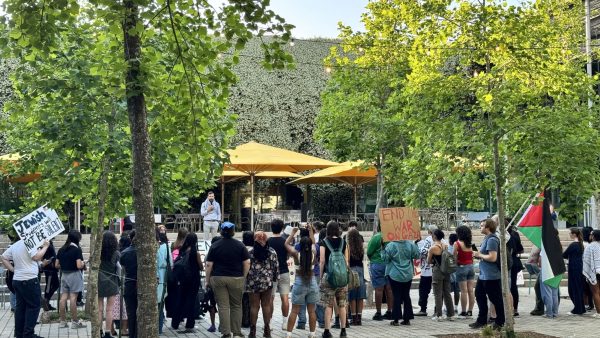Tulane hosts panel on climate change moderated by NPR host
November 22, 2015
Four residents of coastal Louisiana, each from different backgrounds, came up the bayou last Tuesday night to speak about why they will not let politics and climate change take away the place they have always called home.
Students, faculty, staff and community members gathered in Freeman Auditorium to hear a panel of speakers in an event titled “A conversation about rising seas, sinking land, climate change, Louisiana, justice, & community,” moderated by NPR National Correspondent Debbie Elliott.
The panel of speakers included Theresa Dardar, a member of the Pointe-au-Chien tribe, Tyrone Edwards, a reverend in Plaquemines Parish in the deep Louisiana boot, Minh Nguyen, a resident of New Orleans East, and Rosina Philippe, a member of the Atakapa-Ishak Nation in Grand Bayou, Louisiana.
“Its not at all like it was before,” Dardar said. “Some people say that they don’t believe that sea levels are rising … we see it happening everyday, down in the bayous. My husband’s been watching his uncle’s wharf, and it used to be so much higher, and now it’s even with the water … but it’s just that the water is getting up higher, and we’re losing land very fast.”
Edwards spoke of the disturbing rise in number of hurricanes he’s seen as a lifelong resident of the Louisiana bayous.
“In 1965, I was around 13-years-old when Hurricane Betsy came,” Edwards said. “40 years later, Hurricane Katrina came. But in a seven-year period of time from Hurricane Katrina, we’ve seen 7 hurricanes. [When] Hurricane Isaac came seven years later … our community was destroyed because we’re surrounded by water.”
A common point all of the speakers stressed was that despite the frequency and brunt at which they are affected by hurricanes, rising sea levels and coastal erosion due to intruding salt water, the state and federal governments neglect to offer them financial or political aid in the fight to protect their coast against climate change and oil companies looking to carve it up.
“In our community we were at one point forested from the ridge all the way to the river,” Phillippe said. “And with the encroachment of newcomers into our territory to where they have manipulated the landscape … we are now faced with this situation that we see here in Louisiana where our land is salted. It’s going away at a tremendous rate, and also with the salting of the water, we’re losing vegetation that we depend on for our livelihoods.”
In referring to “newcomers,” Philippe partially means oil companies. The most notable example is the BP oil spill of 2010, in which an oil rig off the Louisiana coast exploded and leaked, causing additional severe coastal erosion, as well as severely hampering the cornerstone of the speakers’ livelihood: shrimping.
Another common theme of the talk was a question all speakers are frequently asked: “Why don’t you just move?”
“We’re not moving because we have so much invested,” Edwards said.





















Leave a Comment